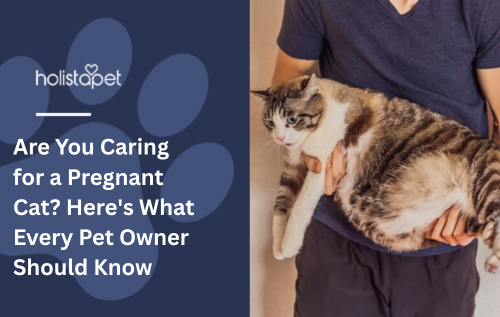Pregnancy in cats can be a beautiful journey, but it also comes with its own set of challenges. Whether your feline friend’s pregnancy was planned or a surprise, understanding how to care for a pregnant cat is crucial to ensuring her health and that of her future kittens.
In this post, we’ll walk you through everything you need to know about pregnant cat care — from signs of pregnancy and nutrition tips to creating a safe birthing environment.
 Signs Your Cat May Be Pregnant
Signs Your Cat May Be Pregnant
Recognizing early pregnancy signs will help you provide the best care from the beginning. Here are common indicators:
-
Enlarged nipples (called “pinking up”)
-
Increased appetite
-
Behavioral changes (more affectionate or withdrawn)
-
Noticeable weight gain
-
Swollen abdomen (visible by week 5)
If you notice these symptoms, schedule a vet visit to confirm the pregnancy.
Nutrition During Pregnancy
A pregnant cat’s nutritional needs increase significantly. Follow these dietary guidelines:
-
🥩 Switch to high-protein kitten food by the 4th week of pregnancy.
-
🥛 Ensure constant access to fresh water.
-
🧂 Avoid supplements unless prescribed by a vet.
-
🍗 Feed small, frequent meals — her stomach capacity decreases as kittens grow.
A vet may recommend specific dietary adjustments based on your cat’s health.
Create a Safe, Comfortable Space
As your cat approaches delivery (typically between 63–67 days), she’ll look for a quiet place to give birth. You can help by:
-
Providing a clean, warm nesting box
-
Lining it with soft blankets or towels
-
Placing the box in a quiet, dim area away from high traffic
Let her explore and get comfortable with the space ahead of labor.
Vet Visits and Monitoring
Regular check-ups are essential. Your vet will:
-
Monitor fetal development via palpation or ultrasound
-
Check for potential health concerns
-
Advise you on what to expect during labor
Stay alert to any signs of distress like discharge, bleeding, or extreme lethargy, and contact your vet immediately if something feels off.
 Frequently Asked Questions
Frequently Asked Questions
How long are cats pregnant?
The average feline gestation period is 63 to 67 days — a little over two months.
Can I still pet and play with my pregnant cat?
Yes! Gentle affection is encouraged, but avoid rough play or lifting her by the belly.
What should I do if my cat starts labor?
Let her labor naturally in her nesting box. If labor lasts more than 24 hours or she struggles to deliver a kitten for more than 1–2 hours, call your vet.
Can pregnant cats be vaccinated?
Generally, vaccines are avoided during pregnancy. Speak to your vet about timing and any necessary medical treatments.
Final Thoughts
Caring for a pregnant cat may seem daunting, but with the right knowledge and preparation, you can ensure a safe, healthy journey for your feline and her future kittens. From nutrition and comfort to timely vet visits, every small action makes a big difference.
Helpful Notes for Cat Owners
-
Spaying your cat post-birth is strongly recommended unless you plan to breed responsibly.
-
Keep other pets and children away from the nesting area during labor and early kitten development.
-
Monitor her post-labor behavior and make sure she’s eating and caring for the kittens.


 CBD Oil for Cats - Fast Acting
CBD Oil for Cats - Fast Acting
 CBD Cat Treats - Easy Dose
CBD Cat Treats - Easy Dose
 CBD Calming Chews for Cats - Highly Rated
CBD Calming Chews for Cats - Highly Rated
 CBG Oil for Dogs and Cats - Loved by Thousands
CBG Oil for Dogs and Cats - Loved by Thousands





Leave a comment
This site is protected by hCaptcha and the hCaptcha Privacy Policy and Terms of Service apply.